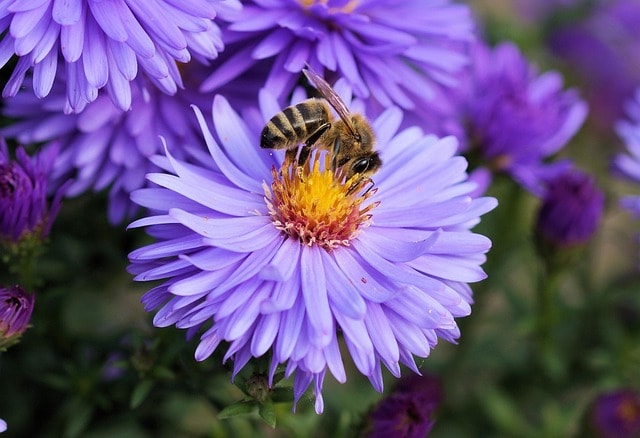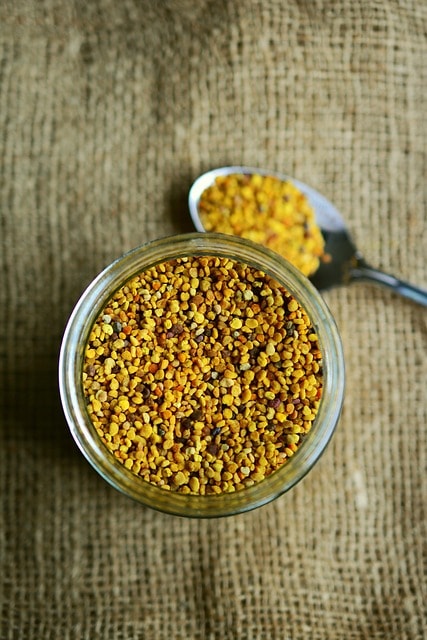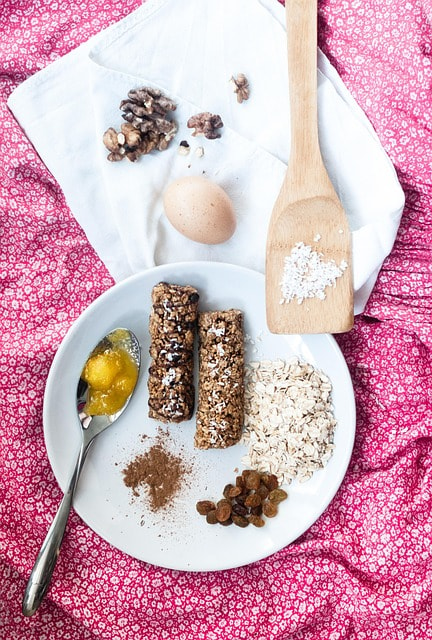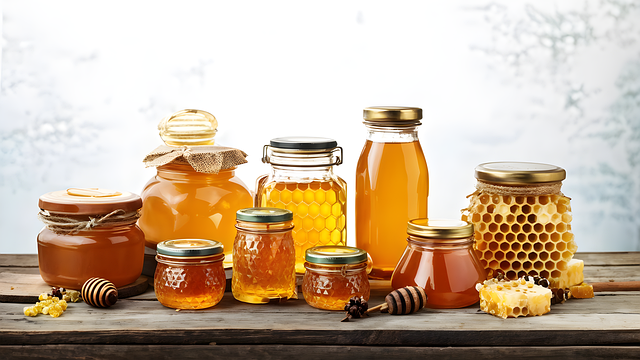Bpollen, a superfood collected by honeybees, is lauded for its rich nutrients and health benefits. This article covers what bpollen is, its uses, and why it’s a go-to dietary supplement for many.
Key Takeaways
-
Bee pollen is a nutrient-rich substance produced by honeybees, containing proteins, vitamins, and essential amino acids, which are vital for both the hive and human health.
-
Consuming bee pollen may boost energy levels, enhance athletic performance, support immune function, and provide relief from seasonal allergies due to its anti-inflammatory properties.
-
Despite its health benefits, bee pollen can cause allergic reactions in sensitive individuals, necessitating precaution and consultation with healthcare providers before use.
What is Bee Pollen?

Bee pollen is a nutritional powerhouse composed of flower pollen, nectar, enzymes, wax, and honeybee secretions. This unique blend is not merely a byproduct of the bees’ foraging activities but essential for the hive’s sustenance. Forager bees gather pollen from flowers, blend it with nectar and their salivary secretions, and store it in brood cells.
Bee pollen’s composition includes:
-
flower pollen
-
digestive enzymes
-
beeswax
-
honey
-
nectar
This complex mixture serves as the primary protein source for the hive, particularly nourishing honeybee larvae and worker bees. Bee pollen serves as a vital food source for the entire hive, underscoring its crucial role in the bees’ ecosystem.
Understanding the intricate processes of bee pollen collection and its role within the hive highlights its nutritional significance. Harvested from flowers and plants by industrious honeybees, this natural product encapsulates the essence of nature’s health benefits.
Nutritional Components of Bee Pollen

Bee pollen is a nutritional goldmine, offering a rich blend of:
-
Simple sugars
-
Proteins
-
Vitamins
-
Minerals
-
Fatty acids
-
Other essential nutrients
Bee pollen contains antioxidants, vitamins, essential minerals, amino acids, and proteins, making it a comprehensive dietary supplement.
B vitamins and vitamin C in bee pollen are particularly notable, contributing significantly to its health benefits. The presence of essential free-forming amino acids further enhances its nutritional value, including:
-
tryptophan
-
phenylalanine
-
methionine
-
leucine
-
lysine
-
threonine
-
histidine
-
isoleucine
-
Valine is one of these amino acids that plays a vital role in muscle repair and immune support, along with vitamin B.
Bee pollen undergoes a fermentation process due to the secretions of bees, which enhances nutrient availability and allows biochemical transformations to break down the pollen walls. This process increases nutrient bioavailability and introduces beneficial bioactive compounds that enhance its health-promoting properties.
Health Benefits of Consuming Bee Pollen

Consuming bee pollen offers a range of health benefits, starting with its ability to boost the immune system and enhance overall well-being. Rich in vitamins and amino acids, this natural supplement may help boost overall energy and immune function, making it a valuable addition to your daily diet.
Research suggests that bee pollen may help lower blood glucose levels, supporting immune health and potentially benefiting individuals with diabetes. Laboratory studies suggest that bee pollen may alleviate some side effects of radiation therapy in cancer patients, indicating its immune-boosting properties. This highlights bee pollen’s potential to combat chronic health issues, including inflammation related to cardiovascular diseases and cancer.
Bee pollen’s nutrient-rich profile makes it an excellent supplement for enhancing energy levels and improving recovery, particularly benefiting athletes. Its blend of vitamins, minerals, and amino acids supports physical and mental activities, making it a versatile supplement for overall well-being.
How to Consume Bee Pollen
Start with a smaller amount of bee pollen, such as half a teaspoon, and gradually increase to a full dose. This gradual approach helps your body adjust and reduces the risk of adverse reactions. Children over two can start with a few granules and slowly increase the quantity.
Incorporate bee pollen into various foods to enhance their nutritional value. Sprinkle it on yogurt, mix it into salads, or blend it into smoothies. This versatility makes it easy to incorporate into your diet, allowing you to enjoy and reap its numerous health benefits effortlessly.
Allergic Reactions and Safety Concerns
Despite its benefits, bee pollen can cause allergic reactions, particularly in individuals with pollen allergies. Allergic reactions may include shortness of breath, hives, swelling, and even anaphylaxis. Individuals with pollen allergies might experience severe reactions, such as itching and light-headedness, after consuming bee pollen.
It’s crucial to recommend consulting your doctor before taking bee pollen. It’s especially vital if you have health concerns or are on medication. Bee pollen can interact with anticoagulants, such as warfarin, increasing the risk of bleeding or bruising. Being aware of these potential risks ensures that you can enjoy the benefits of bee pollen safely.
Bee Pollen vs. Other Bee Products

Bee pollen is one of many beneficial products derived from bees. Compared to other bee products, such as royal jelly and honey, bee pollen products have a unique nutritional profile. Bee pollen contains around 250 substances, including amino acids, lipids, and vitamins, while royal jelly is richer in nutrients and often considered more potent for health.
Bee bread, made by mixing pollen with honey, serves as a fortified food supply primarily for nurse bees. Honey is primarily composed of sugars and serves as a food source for bees during winter, while also providing numerous health benefits to humans.
Royal jelly, produced by nurse bees, is known for its potential anti-aging properties and is fed exclusively to the queen bee to support her reproductive capabilities. Each bee product has unique benefits and uses, making them valuable additions to a health-conscious lifestyle.
Bee Pollen and Athletic Performance
Bee pollen is often praised for its potential to enhance athletic performance due to its rich nutritional content. Containing approximately 30.8% digestible carbohydrates, primarily as reducing sugars like fructose and glucose, bee pollen provides a quick source of energy for athletes.
The average protein content in bee pollen is about 22.7%, with essential amino acids constituting 10.4% of this total. These nutrients are crucial for muscle repair and recovery, making bee pollen an excellent supplement for enhancing energy levels and athletic performance.
Athletes can benefit from bee pollen’s comprehensive nutrient profile, supporting energy levels, recovery, and overall physical performance. Adding bee pollen to an athlete’s diet can provide the essential nutrients needed for optimal performance and endurance.
Bee Pollen’s Role in Treating Seasonal Allergies
Bee pollen’s anti-inflammatory properties make it a promising natural remedy for seasonal allergies. Research suggests that bee pollen may help alleviate symptoms of seasonal allergies by reducing inflammation and enhancing the immune system.
Studies show that bee pollen can inhibit mast cell degranulation, a key process in allergic reactions, thereby reducing the severity of allergic symptoms. The immunomodulatory effects of bee pollen can enhance the body’s ability to manage allergic reactions, providing relief for individuals with seasonal allergies.
Anecdotal evidence suggests that adding bee pollen to the diet might alleviate allergic symptoms, although further clinical trials are needed to confirm these benefits. Flavonoids and other compounds in bee pollen contribute to its anti-allergic effects, making it a potential natural treatment for allergies.
Bee Pollen for Skin Health

Bee pollen benefits skin health due to its antioxidant activity and rich nutrient profile. Phenolic compounds in bee pollen help protect the skin from oxidative stress, while vitamins enhance skin health and vitality.
Bee pollen’s anti-inflammatory properties can reduce skin inflammation by inhibiting enzymes involved in the inflammatory process. Its antifungal and antimicrobial properties make it effective for topical application and skin healing.
Products containing bee pollen are often used in cosmetics at concentrations ranging from 0.5% to 5%, which benefits skin hydration and elasticity. This nutrient-rich composition makes bee pollen a valuable ingredient in skincare routines.
Bee Pollen in Medical Research
Ongoing medical research focuses on bee pollen due to its significant health and medicinal properties. It enhances bodily functions and offers protection against various diseases. Research suggests that bee pollen may benefit men who have chronic prostatitis and help manage symptoms of premenstrual syndrome (PMS).
Clinical studies show that bee pollen can significantly enhance the efficacy of treatments for prostatitis, highlighting its medicinal potential. Bee pollen has cardio-protective effects, reducing heart damage and decreasing inflammation, making it a valuable addition to heart health.
Research suggests that bee pollen could protect liver health by mitigating oxidative stress. Its antioxidant capabilities are being investigated for their role in preventing cognitive decline, with studies using tests such as the Morris water maze and Y-maze test to evaluate their impact.
Ongoing research continues to explore the potential applications of bee pollen in various health conditions, underscoring its promise as a natural remedy for diseases with wide-ranging benefits and as a possible cure.
Summary
Bee pollen is a versatile and nutrient-rich supplement that offers numerous health benefits, from boosting the immune system to enhancing athletic performance. Its rich blend of vitamins, minerals, and amino acids makes it a valuable addition to any diet.
Whether you’re looking to improve your overall health, support athletic performance, or manage allergies, bee pollen can be a powerful natural remedy. As always, please consult with a healthcare professional before incorporating new supplements into your routine to ensure they are safe and beneficial for you.
Frequently Asked Questions
What is bee pollen composed of?
Bee pollen comprises flower pollen, nectar, enzymes, honey, wax, and bee secretions, making it a complex natural substance rich in nutrients. This diverse composition contributes to its renowned health benefits.
What nutrients are found in bee pollen?
Bee pollen is rich in simple sugars, proteins, vitamins, minerals, fatty acids, antioxidants, and amino acids, making it a highly nutritious supplement. Its diverse nutrient profile can contribute to overall health.
How can bee pollen benefit my health?
Bee pollen can significantly enhance your health by boosting the immune system, lowering blood glucose levels, and improving energy and athletic performance. Incorporating it into your diet may also help combat chronic health issues.
How should I start consuming bee pollen?
To start consuming bee pollen, begin with half a teaspoon and gradually increase the dosage as needed. For children over two, a few granules are recommended as a starting point.
Are there any safety concerns with bee pollen?
Yes, there are safety concerns with bee pollen, particularly for individuals with pollen allergies. It is essential to consult a doctor before use, especially if you have existing health issues or are taking medication.





